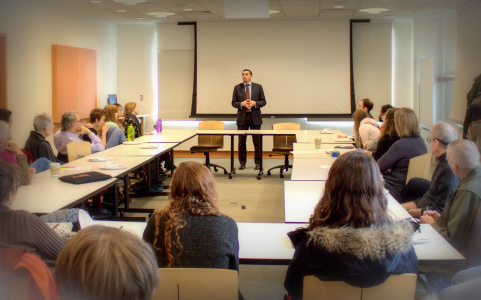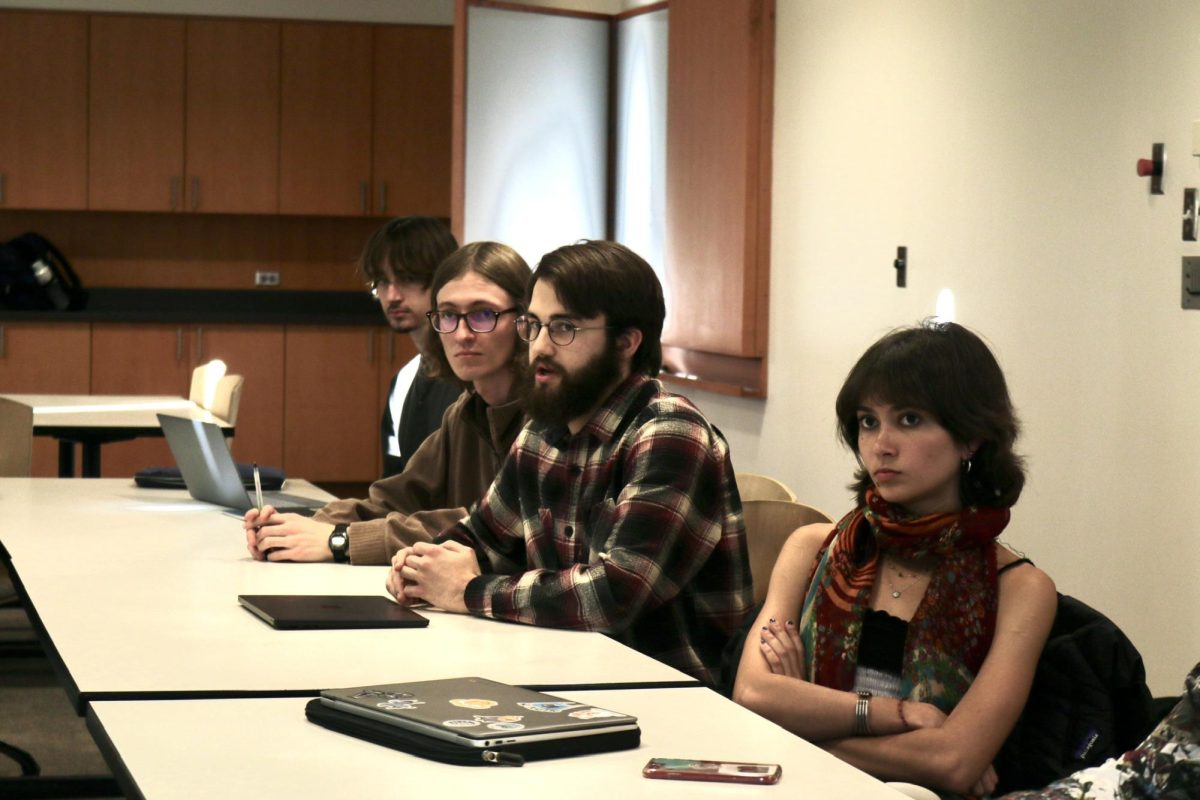After returning to Grinnell College and visiting old friends and peers, Ahmed Ali ’06 spoke in JRC 209 on Tuesday, Nov. 18 about the political challenges facing Iraq, particularly the resurgence of the Islamic State of Iraq and Syria (ISIS) and other internal conflicts. The Rosenfield Program in Public Affairs, International Relations and Human Rights sponsored the event.
Ali, a senior research analyst on Iraq at the Institute of War in Washington, D.C., has researched the country since graduating in 2006 and also worked as an analyst at Georgetown University. He lauded the College for the impact that it has had on his current field of study and helping him pursue his passions.
“Grinnell had a big impact on what I do now; I studied political science here and I’m delighted to be back in this wonderful community, ” Ali said in front of an audience of fellow Grinnellians.
He stated that during his time as a student here, he did not feel as if there was sufficient attention paid to issues in the Middle East and saw the interest in his talk as evidence that awareness in this area has increased on campus.
“What we have today in Iraq is a civil war,” he said. “Today, 40 percent of Iraq is not under government control [whether controlled by ISIS or other groups], which is abnormal. This has resulted in very little trust in communities, and created civil war conditions.”
Following, Ali summarized the current intra-political climate, describing how the extremist Sunni organization known as ISIS has targeted groups of Iraqi Shia and Kurds. Ali added that ISIS also marginalizes non-member Sunnis.
Ali defined ISIS as not only a “most dangerous terrorist organization” but also as a threatening and capable military organization with political power. He described the group as being “very brutal in their attempts to impose an extremist version of Islam.”
“[ISIS] does not just carry out guerrilla attacks; they have those command structures in place. ISIS has controlled Mosul, Iraq’s second-biggest city, since June 2014,” he said.
Despite the fact that the international news media only started covering the organization in earnest about six months ago, Ali stressed that ISIS has had a presence in Iraq since 2001, before the Iraq War. He said that in 2003, following the fall of Saddam Hussein, the group became stronger and began to attack U.S. forces, Iraqi civilians and other oppositional groups. During a period of intense public opposition, ISIS went underground in 2007-2008. Ali noted that it began to regroup and re-organize its efforts in Iraq in 2011, and expanded to

Photo by Megan Pachner.
Syria in 2013, taking advantage of the “vacuum of power” due to that nation’s civil war.
Ali also elaborated on the role of other nations in Iraq, noting that many Iraqi Shia militias are backed by Iran, a nation with several alliances in Iraq. Defining Turkey and Iran as regional powers, Ali discussed how these bordering nations have a vested interest in preventing the spread of ISIS throughout the Middle East, noting that ISIS wants to expand to Jordan and Egypt.
“The most threatening part of ISIS is that it is a multinational organization,” Ali said, noting that the group approximately has 130 American members in addition to a number of members of European descent. Nonetheless, Ali believes that the group can still be defeated, no matter how imposing it may seem.
“These people have the capacity to carry out attacks in other countries. However, ISIS is defeatable, and it is important for the U.S. to be involved in containing this transnational threat,” he said.
Despite the challenges facing Iraq, Ali does not believe the country will dissolve into separate nations, an idea that he noted has been tossed around ever since the U.S. became involved in Iraq 11 years ago, but has never come to fruition.
Afterwards, audience members mentioned that they enjoyed hearing Ali’s talk but felt that some topics were not given sufficient attention.
“I enjoyed the talk but I felt some aspects of the relationship between ISIS and the U.S. were glossed over even though the importance of the relationship was stressed, such as the future of U.S. involvement,” said Ella Gensheimer ’17. “I would have liked to hear more about Ali’s thoughts on how he thinks Iraq will progress.”
Because Ali spoke for only about 20 minutes, there was plenty of time for the audience to ask questions. The crowd, which was heavily composed of faculty, was generally very receptive to Ali’s points, although a number of them echoed Gensheimer’s sentiments about the specifics of the extent the United States should continue to be involved in Iraq. Ali responded that he too is frustrated by the ongoing situation, and that the more time ISIS has to develop, the worse the situation gets.
“Iraqis can’t handle the threat of ISIS on their own,” he said. “Every day the international community waits [to take action], ISIS gets stronger.”





















































Chris Gaunt • Nov 22, 2014 at 10:48 pm
I was present for Ali’s talk and by the end a sadness fell over my heart when it seemed like an already-too-late military intervention by the U.S. was Iraq’s only hope.
I wonder if more U.S. military intervention will produce more desire to seek revenge against the U.S.
Arafat • Nov 22, 2014 at 4:36 pm
I’ve got a novel idea. Let’s do nothing. Let the Muslims deal with their own problems for a change. Let’s let countries like Saudi Arabia, Qatar, Kuwait with their endless ocean of money and Western-bought armaments figure it out instead. Surely they – being practitioners of the religion of compassion and peace – will step right up to the plate in our stead.
OK, you caught me there. You knew I was kidding! You knew what I know which is that there is no answer to these Islamic cesspools. Whatever we do will be discredited and if we do nothing then Syria will become just another country in the endless line of Hell on Earth Islamic countries.
We cannot save Muslims from themselves. It is like trying to save an alcoholic. Until they are ready to abandon their religion – a religion that emphasizes aggression and violence and sadism – anything we do will simply be a band-aid on a gaping wound.
Let them go through their DTs on their own. Only then will they be ready for our friendship and help, and only then will we find a way forward together as friends.